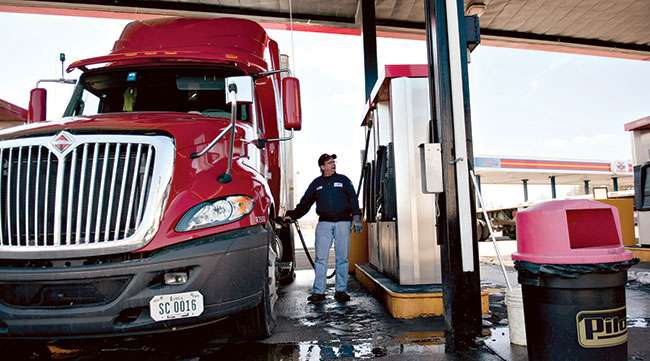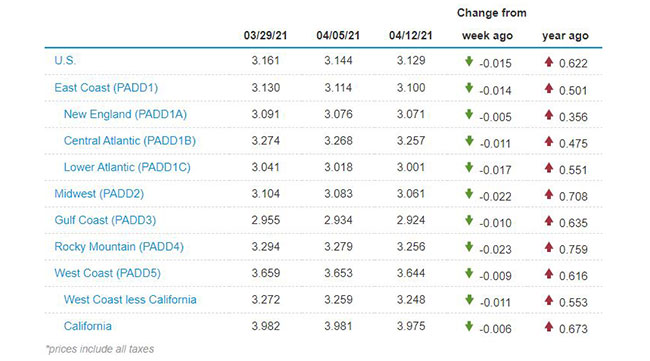Diesel Sheds 1.5¢ to $3.129 a Gallon

[Stay on top of transportation news: Get TTNews in your inbox.]
The national average price of a gallon of diesel slipped 1.5 cents to $3.129, according to Energy Information Administration data released April 12.
“We have had a wholesale drop in prices since essentially March 15,” Tom Kloza, founder of the Oil Price Information Service, told Transport Topics. “There’s been some sideways action here and there on wholesale, but generally, prices for gasoline are about 22 cents lower than they were in mid-March and prices for diesel are probably in that same neighborhood.”
Kloza described the current trend as an interlude and noted that it could go a couple of different ways going forward. The first is finding out whether recent lockdowns and rising coronavirus cases in some parts of the world restrict mobility. Additionally, the investment banks could be right and oil demand might outstrip supply. There also is a chance that the Saudis and Russians could put some additional oil on the market.
Highlights
- Diesel has declined in price for three consecutive weeks, totaling 6.5 cents, after 20 straight weeks of increases totaling 82.2 cents.
- A gallon of diesel on average costs 6.22 cents more than it did a year ago at this time.
- Diesel’s price declined in all 10 regions in EIA’s survey, with the Rocky Mountain region (2.3 cents) and Midwest (2.2 cents) posting the biggest drops.
- The average price of gasoline dropped eight-tenths of a cent to $2.849 a gallon, which is nearly a dollar (99.6 cents) more than a year ago.
“As somebody who’s been doing this a long time, I can tell you right now it’s very dull,” Kloza said. “But I also know that whenever I say that, I can count on something happening that triggers a big move very quickly.”
Kloza added that markets for stocks and agricultural products are active. That could have an impact with soybean oil contributing significantly to biodiesel. But he noted that despite activity in the energy space, gasoline and diesel prices have been somewhat soft.
“The softness is something you see on the wholesale side, as opposed to the street,” Kloza said. “I mean, you’re driving around and you’re looking at the street prices, you’re thinking that we haven’t had any kind of significant move in prices since March 15. But we’ve had quite a drop in gasoline and diesel.”
U.S. On-Highway Diesel Fuel Prices

EIA.gov
Kloza also expressed concern that going into the summer there may be issues on the logistics side. There is the potential that not enough tank truck drivers will be available to deliver fuel to terminals and stations on a regular basis to ensure continuity. He noted a lot of that capacity was downsized last year because of the drop in demand.
“I think that’s probably going to be something we have to watch out for this summer,” Kloza said. “I agree with the EIA in that we’re not going to match summer demand for 2019.”
He disagrees with those who believe demand will make a massive turnaround.

Kloza
“There’s a lot of nonsense with people who are saying things like that. … But we do have to be aware of logistical issues,” Kloza said.
Western Flyer Express CEO Randy Timms has been paying close attention to prices since before the presidential election. He anticipated that if Joe Biden won, prices would increase.
“We’ve seen nothing but fuel prices rising since October,” Timms told TT. “My point to our company was, even back previous to the election, if Biden gets elected, fuel prices are going up. And so we were already looking at getting back into fuel-conservation mode.”
Timms is not optimistic the recent declines in fuel prices are here to stay. Instead, he believes the increases the industry saw toward the end of last year and at the beginning of this year will be the norm going forward.

Western Flyer Express CEO Randy Timms says trucking is in a strong freight market. (Dan Gillett)
“I think it’s a long-term trend,” Timms said. “I don’t see it pulling back from these levels. I feel like we’re going to see little dips along the way, but I think prices will continue to rise over the next several months. When you impose more regulation on any industry, the result of that tends to be a higher price.”
Timms added that his business and the industry are still in good shape despite the rise in fuel prices. But he is concerned over just how long that will last.
“We’re in a strong freight market right now,” Timms said. “Everybody knows trucking is good. Rates are good. So it’s not as big of an impact as it would have been, say, back in 2018 when the freight market was in the tank.
“So from that perspective, I feel like we were faring just fine. But at some point, the demand will decrease, rates will decrease, fuel prices will still be going up, and we’ll start feeling the pinch somewhere here in the future.”
Want more news? Listen to today's daily briefing below or go here for more info:

